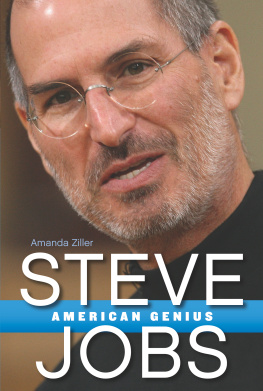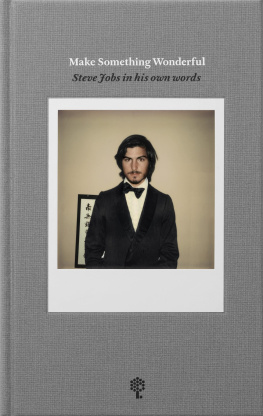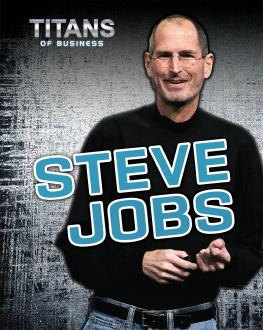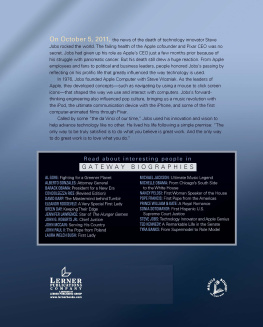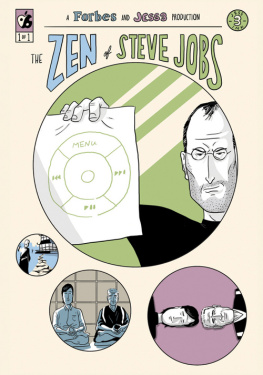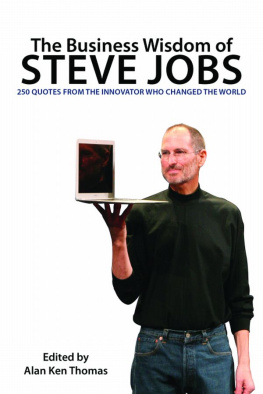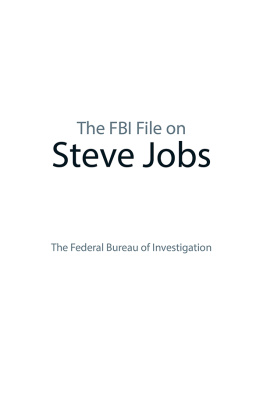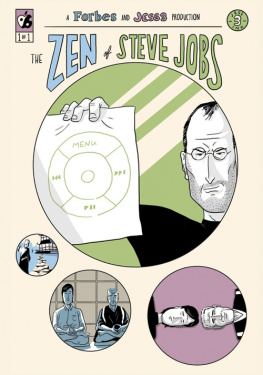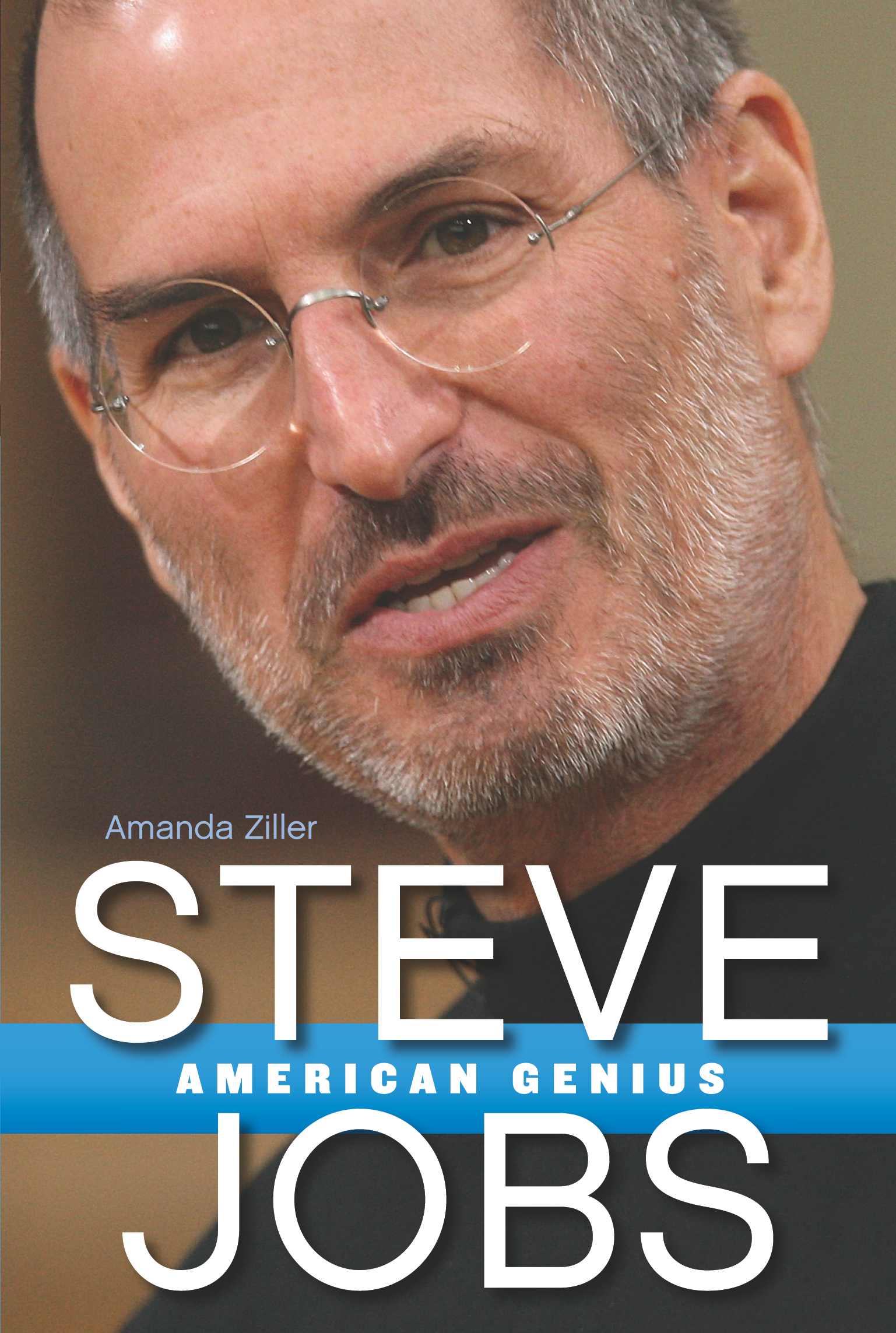
For Dad, Mom, GG, GJ, Maggie, and Max
Contents
Prologue
Only Connect
Do you have an iPod, an iPhone, or an iPad? Have you ever downloaded a song from iTunes? Do you have a favorite app?
Our personal computers, laptops, MP3 music players, and smartphones have become such a huge part of our lives that its hard to imagine what the world would be like without them. Until only about thirty years ago, these products did not even exist.
When Steve Jobs was twenty-one years old, he started a company with his best friend, Steve Wozniak. They decided to call it Apple Computer, and a few years after they began building computers in Jobss garage, Apple had grown into a billion-dollar business. John Sculley, who was CEO of Apple from 1983 to 1993, said this about Apple cofounder Steve Jobs: [Jobs] believed that the computer was eventually going to become a consumer product. That was an outrageous idea back in the early 1980s. Many of Jobss ideas may have seemed outrageous to others of his time, but without his innovations, the way we live would be very different today.
If it werent for Steve Jobs, we wouldnt have:
Computers with a screen monitor, keyboard, and mouse
Computer screens that can display icons, pictures, videos, etc.
A mouse that can move in all directions, drag and drop, and double click
A huge choice of fonts, or fonts named after famous cities around the world (Chicago, Geneva, London, New York, and Venice are just a few examples)
Pixar movies and characters such as Woody, Buzz Lightyear, Nemo, WALLE , and Lotso
The iPod and iTunes
The iPhone, the App Store, and electronic devices with motion sensors (the technology that makes the screen on the iPhone flip when you turn it sideways)
The iPad and the iBookstore
Steve Jobss impact on our world has been enormous. He has often been compared to many of the worlds greatest inventors: Thomas Edison, Henry Ford, Alexander Graham Bell, and others. Like Edison, Jobs brought great changes to the world through technological advancements. Jobs personally admired and modeled his career after Edwin H. Land, the inventor of instant photography and cofounder of the Polaroid Corporation. According to Jobs, what he and Land had most in common was that they both saw the intersection of art and science and business.
Technology alone is not enough, Jobs said. Its technology married with liberal arts, married with the humanities, that yields us the result that makes our heart sing. Jobs also believed, It isnt the consumers job to know what they want. These two tenets greatly influenced his approach to the world around him. Maybe because he was interested in so many different things, he was able to imagine how the development of new technologies could help people. From an early age, he was immersed in electronic engineering. He had a deep understanding of the science behind building electronic devices. But he also had the artistic creativity to adapt science to fit peoples needsoften before the world even knew what it needed.
Chapter 1
Origins
When asked about his origins, Steve Jobs said, I was born in San Francisco, California, USA, planet Earth, February 24, 1955. He was adopted at birth by Paul and Clara Jobs. His biological mother, Joanne Schieble (who eventually took the name Joanne Simpson), later worked as a speech therapist. His father, Abdulfattah John Jandali, was a Syrian who became a political science professor. They met at the University of Wisconsin, where they were both graduate students.
Jobs was always known to be quite private about his personal life, but in the years before his death, he opened up to his biographer, Walter Isaacson. Joanne Schieble grew up in rural Wisconsin. Her parents were German and very religious Catholics. Jandali was from a wealthy and influential Syrian family. He described Joannes father as a tyrant, and, according to Isaacson, her father threatened to disown Joanne if she married an Arab. For this reason, as well as because they were only twenty-three years old at the time and both still in graduate school, they chose to give their son up for adoption.
Jobss father has since told reporters that Schieble upped and left [Wisconsin, where they were living at the time] to move to San Francisco to have the baby without anyone knowing, including me. Jandali claims that he would have chosen to keep his son if it had been solely up to him but that he wanted to support Schiebles wishes at the time.
Schieble told her doctor she felt very strongly that her childs adoptive parents should be highly educated. Originally, a lawyer and his wife were planning to adopt her son. However, when the baby was born, they decided that they wanted a girl and backed out of the adoption. The next couple on the list were Paul and Clara Jobs. Paul Jobs was a working-class machinist who had not finished high school, and Clara Jobs had not completed her college education.
At his 2005 Stanford University commencement address, Steve Jobs shared some of his personal story with the graduating class. He told them that when his biological mother learned that his adoptive parents were not college graduates, she refused to sign the final adoption papers. She only relented a few months later when my parents promised that I would someday go to college. According to the authorized biography, Steve Jobs , by Walter Isaacson, Paul and Clara Jobs signed a pledge to start a savings account for their sons college education. Even if she didnt feel ready to raise a child herself, its clear by his biological mothers actions that she cared deeply for his well-being.
A few months after Jobss birth and adoption, his birth parents married. Joanne Schiebles father passed away around this time, and maybe she felt free to make her own decisions. Jandali has recently said, I think after we got back together, Joanne had second thoughts about adoption, but by then, there was nothing we could do about it. If we had just held off for a few months, then we would have been able to raise Steve as our own, but sadly, that was not the case. We often spoke of our son and how we both wished he was with us.
Two years after they had Steve and married, Schieble and Jandali had another child, a daughter named Mona. They raised her until she was four years old. The couple divorced, and Jandali became an absentee father to Mona. He did not have a relationship with her until years later. Because Jobss adoption was a closed adoption, Steve had no contact with his birth parents as a child. It was only as an adult that he discovered he had a biological sister.
Imagine how Jobss life could have turned out differently if he had been kept by his birth parents, adopted by the lawyer and his wife, or maybe adopted by another couple if his birth mother had never agreed to sign the adoption papers for Paul and Clara Jobs.
Jobss early childhood experiences shaped his mind and his personality, making him the man he would become. His parents were always open with him about discussing his adoption, focusing on the fact that they chose him and that he was special. Maybe it gave him a sense of his own uniqueness and the courage to be a truly independent thinker. Even though he was adopted, Jobs said in his biography that Paul and Clara were my parents 1000%.
Steve Jobs described his father, Paul, as a genius with his hands. A high school dropout, Paul joined the coast guard in World War II. Jobs told his biographer a story about how his parents met and married. Pauls friends bet him that he couldnt find a woman to marry in a two-week time frame. He won the bet and Clara as his bride.
Paul worked for many different technology companies throughout the years. Steve Jobs remembered his father teaching him how to build things from a very early age. He had a workbench out in his garage where, when I was about five or six, he sectioned off a little piece of it and said Steve, this is your workbench now. And he gave me some of his smaller tools and showed me how to use a hammer and saw and how to build things. It really was very good for me. He spent a lot of time with me... teaching me how to build things, how to take things apart, put things back together. Jobss mother, Clara, held a variety of different jobs, including working as an accountant, a schoolteacher, and a bookkeeper. She taught her son how to read when he was only three years old.

